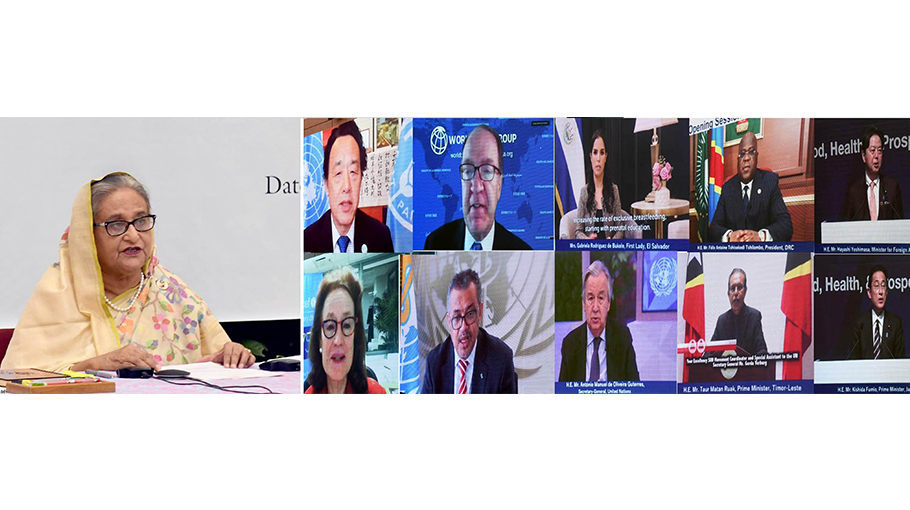PM for united efforts to address Covid challenges


Prime Minister Sheikh Hasina on Tuesday laid emphasis on united efforts to address the Covid-19 challenges and its impacts on public health as the pandemic has marked a significant setback on the nutrition initiatives.
"Urgent actions and united efforts are needed to address the challenges of Covid-19, along with its impacts on public health and nutrition," she said.
The premier made this remark while virtually addressing the "Tokyo Nutrition for Growth (N4G) Summit 2021" held in Japan.
As the summit comes at a critical time, midway of the United Nations (UN) Decade of Action on Nutrition, she opined that it is the time for bold commitments to develop "a global partnership to end all forms of malnutrition".
Mentioning that ensuring nutrition for all citizens is a daunting task, she said investment in nutrition security generates high socio-economic returns leading the way to sustainable growth and development.
The prime minister also placed five-point proposals to ensure healthy and nutritious diets for the growing population.
In her first proposal, she said international community needs to work together to tackle the challenges of Covid-19, including its impact on nutrition programmes.
Secondly, she opted for the enhanced collaboration to advance research for growing high yielding nutritious foods.
She, in her third proposal, called for building food banks at regional and global levels to be secured from emergency disasters.
Fourthly, the premier stressed the need for exchanging of best practices and expertise to increase nutrient contents in food.
In her final proposal, she urged all to disburse the committed climate adaptation fund to adapt to the climate-led extreme events that hamper food production in the developing world.
Sheikh Hasina said Bangladesh has made immense achievements and substantial progress in economy, food security, health and nutrition during the last one decade.
She mentioned her government's different initiatives undertaken to enhance nutrition status of disadvantaged people.
She said the initiatives included allowances for vulnerable groups under social safety-net programs, cash allowances for insolvent pregnant and lactating mothers, mid-day meals for school students.
The head of the government added: "We are diversifying production of grains, vegetables, fish, meat, eggs, and fruits with the goal of increased food security and improved nutrition."
She continued that they started their actions giving dividend as the poverty rate came down to 20.5% from 31.5% during the past one decade.
She went on saying the country is on track for achieving its child nutrition status as malnutrition rates have also declined.
She said stunting of children decreased from 43% in 2007 to 31% in 2017 which is now below WHO critical threshold.
Wasting declined from 17% to 8% and underweight from 43% to 22% during the same period, she said, adding, overweight among under-5 children is 2.4% whereas regional rate is 5% and global 6%.
The premier said: "We aim to strengthen our commitments made at earlier nutrition Summits to achieve the SDGs and improve nutrition outcomes in line with our Five-Year Plan."
She expressed her pledge to address the double burden of malnutrition through 12 commitments which are aligning with SDGs.
She said, "These will be achieved through a multi-sectoral approach, leveraging both domestic and development finances."
Japanese Prime Minister Kishoda Fumio, DRC President Félix Antoine Tshisekedi Tshilombo, Japanese Foreign Minister Yoshimasa Hayashi, United Nations Secretary general António Guterres, World Bank President David Malpass, WHO Director General Dr Tedros Adhanom and UNICEF Executive Director Henrietta H Fore, among others, also spoke in the high-level session.
In addition, video messages from Timor-Leste Prime Minister Taur Matan Ruak and El Salvador First Lady Gabriela Rodriguez were played.



